Executor/ExecutorService in Java, and ExecutionContext behind Future in Scala
Overview
You can find the code and instruction to run the example at GitHub.
Thread in Java
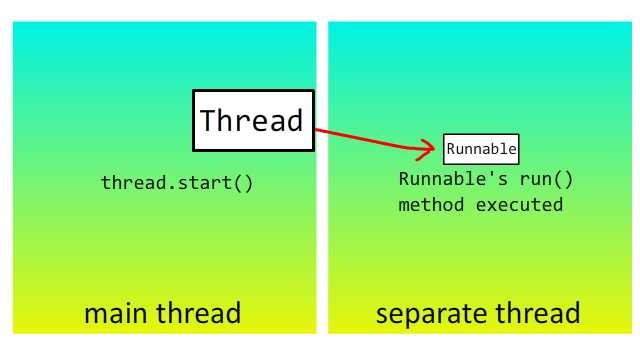
Thread and Runnable has been there for long as the very first generation of concurrent execution approaches in Java. The concept and usage are rather simple, where you extend Runnable and implement the run method which represents the operation you want to execute concurrently.
(Runnable is from Java, but here I'm defining a Scala class extending it.)
class PrintRunnable extends Runnable {
def run(): Unit = {
println(s"[${Thread.currentThread()}] - PrintRunnable run() is executed")
}
}Then you instantiate a Thread by passing in a Runnable instance, and call the start() method.
println(s"[${Thread.currentThread()}] - main thread")
t = new Thread(new PrintRunnable(1))
t.start()Then you will get output like this. The Thread names are enclosed in [], which show that the main thread - (i.e.) one which did t = new Thread(new PrintRunnable(1)) - and the thread running Runnable are different - (i.e.) Concurrently executed.
[Thread[run-main-0,5,run-main-group-0]] - main thread
[Thread[pool-8-thread-1,5,run-main-group-0]] - PrintRunnable run() is executedTypically after you call the start() method of Thread, you also call the join() method to wait until the thrad dies.
t.join()Executor and ExecutorService in Java
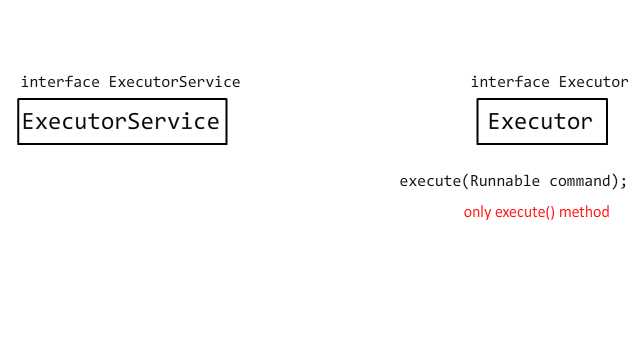
The next generation of Java concurrency execution approach was Executor and ExecutorService.
While Thread allowed you handle concurrent execution in a separate thread, but when it comes to the point where you handle many threads for many different purposes in the same application, it becomes unmanagable.
Executor and ExecutorService control Thread instances in the background so that you don't handle each single Thread by yourself, which is tedious, but rather you do higher level of control by handling a group of Thread instances (ThreadPool, which is not explained in this article though) via ExecutorService.
Let's look at the code - firstly Executor is a very simple interface which only has this single execute method.
public interface Executor {
/**
* Executes the given command at some time in the future. The command
* may execute in a new thread, in a pooled thread, or in the calling
* thread, at the discretion of the {@code Executor} implementation.
*
* @param command the runnable task
* @throws RejectedExecutionException if this task cannot be
* accepted for execution
* @throws NullPointerException if command is null
*/
void execute(Runnable command);
}And ExecutorService is also a Java interface which extends Executor
public interface ExecutorService extends Executor {
...
}and define those lifecycle management methods (and some other methods).
...
void shutdown();
List<Runnable> shutdownNow();
boolean isShutdown();
boolean isTerminated();
boolean awaitTermination(long timeout, TimeUnit unit)
throws InterruptedException;
...There are factory methods available in the Executors class like this one, which creates a group of 5 threads in the background:
val executor = Executors.newFixedThreadPool(5);
executor.execute(new PrintRunnable)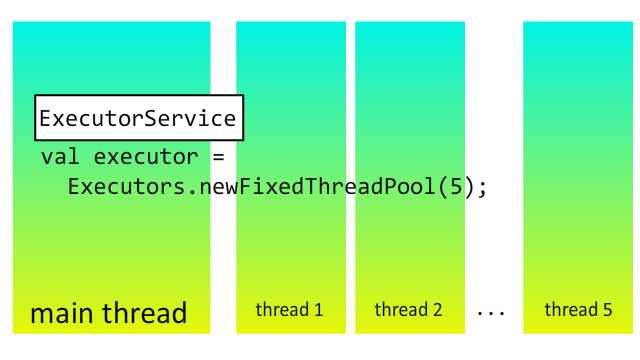
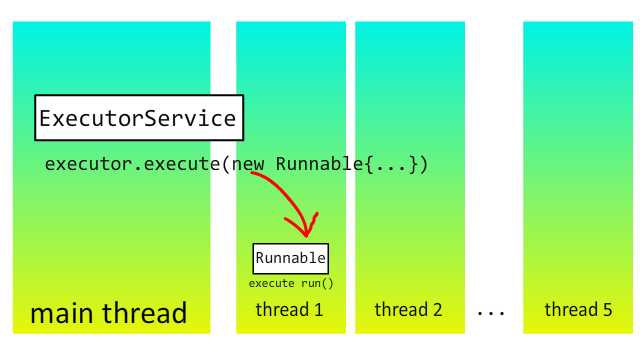
and the execute call let ExecutorService execute PrintRunnable in the background threads.
Note that you didn't specify which exact thread the PrintRunnable should be run in, but instead, you asked ExecutorService to decide the actual thread to run it.
ExecutionContext, and how it works with Future
Now we move onto Scala's Future. Scala's Future is used with Scala's ExecutionContext, both of which I will explain below in the article.
(I'm intentionally saying Scala's Future as there is also Java's Future and that is different from Scala's. I will not talk about the Java Future in this article.)
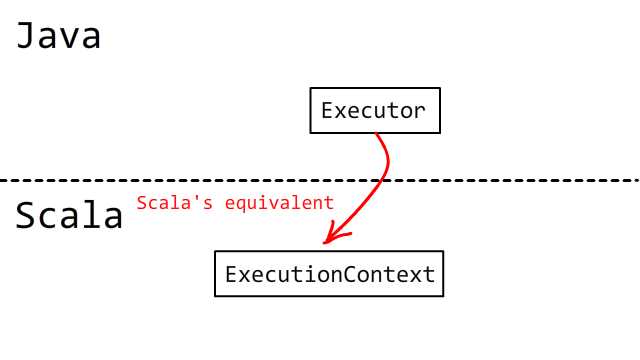
You can think of ExecutionContext in Scala is kind of equivalent to Executor in Java.
It has the following execute method.
trait ExecutionContext {
def execute(runnable: Runnable): Unit
.. // only few other methods (two other methods as of Scala 2.12.4)
}
However, you don't call the execute() method of ExecutionContext directly, but you should implicitly declare ExecutionContext like below.
implicit val executionContext: ExecutionContext =
ExecutionContext.Implicits.global(Little bit side-tracked, but in production code, you shouldn't use ExecutionContext.Implicits.global, as you will need more flexibility and careful configuration of the background thread pool, like number of threads, whether it's fixed thread pool or fork-join, etc)
Then you call Future{...} which is Future companion object's apply method,
def printThreadInsideFuture(): Unit =
println(s"[${Thread.currentThread()}] - printThreadInsideFuture() is executed")
val f = Future{ printThreadInsideFuture() } that takes an implicit parameter of ExecutionContext.
def apply[T](body: =>T)
(implicit executor: ExecutionContext): Future[T]By doing this, you let the implicit-ly passed ExecutionContext execute the body of Future you passed in, in one of the background threads.
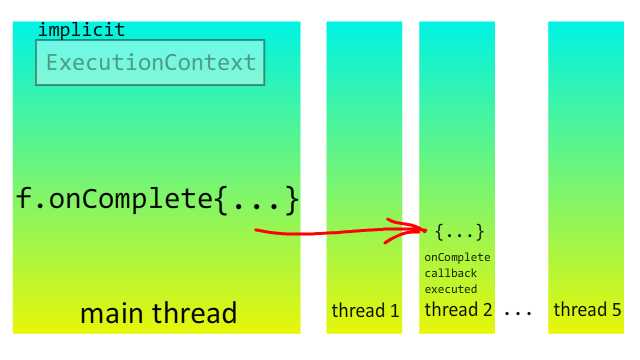
Scala's Future also has onComplete method which lets you execute a callback function taking the return value from the Future body you earlier passed.
The callback should have case Success and case Failure because a Future can fail without completing the passed-in Future body for whatever reasons.
def printThreadInsideCallback(): Unit =
println(s"[${Thread.currentThread()}] - printThreadInsideCallback() is executed")
// The callback passed to onComplete is either be
// applied immediately or be scheduled asynchronously.
f1.onComplete{
case Success(_) =>
printThreadInsideCallback()
case Failure(_) =>
println("Future failed!!")
}In Scaladoc, Future's onComplete has the following comment, explaining its behavior.
When this future is completed, either through an exception, or a value,
apply the provided function.
If the future has already been completed,
this will either be applied immediately or be scheduled asynchronously.
Note that the returned value of `f` will be discarded.Details of onComplete can be found in the official Future doc
Inter-operabilities between Executor/ExecutorService and ExecutionContext
You might get into a situation where you have a Scala application dependent on some Java libraries, which only expects Executor or ExecutionContext, not knowing Scala ExecutionContext at all.
To deal with such a situation, Scala provides the following two traits bridging the gap between Executor/ExecutorService and ExecutionContext. You'll create an instance of eitehr ExecutionContextExecutor or ExecutionContextExecutorService, then that can be passed as Executor/ExecutorService to Java libraries, as well as ExecutionContext to Scala libraries.
/**
* An ExecutionContext that is also a
* Java Executor.
*/
trait ExecutionContextExecutor
extends ExecutionContext
with Executor/**
* An ExecutionContext that is also a
* Java ExecutorService.
*/
trait ExecutionContextExecutorService
extends ExecutionContextExecutor
with ExecutorService(Indeed for example, Akka's Dispatcher extends ExecutionContextExecutor so that it works as ExecutionContext to run Future bodies, and Executor to work in Java libraries)
Instruction to run the example, and output
> git clone https://github.com/richardimaoka/resources.git
> cd resources
> cd executor-and-execution-context
> sbtThere are multiple object Main defined under separate packages.
So, to run the thread example under the example.thread package:
> runMain example.thread.Main[info] Running example.thread.Main
[Thread[run-main-1,5,run-main-group-1]] - main thread
[Thread[Thread-4,5,run-main-group-1]] - PrintRunnable(2) run() is executed
[Thread[Thread-3,5,run-main-group-1]] - PrintRunnable(1) run() is executed
[Thread[Thread-6,5,run-main-group-1]] - PrintRunnable(4) run() is executed
[Thread[Thread-8,5,run-main-group-1]] - PrintRunnable(6) run() is executed
[Thread[Thread-5,5,run-main-group-1]] - PrintRunnable(3) run() is executed
[Thread[Thread-9,5,run-main-group-1]] - PrintRunnable(7) run() is executed
[Thread[Thread-12,5,run-main-group-1]] - PrintRunnable(10) run() is executed
[Thread[Thread-7,5,run-main-group-1]] - PrintRunnable(5) run() is executed
[Thread[Thread-11,5,run-main-group-1]] - PrintRunnable(9) run() is executed
[Thread[Thread-13,5,run-main-group-1]] - PrintRunnable(11) run() is executed
[Thread[Thread-10,5,run-main-group-1]] - PrintRunnable(8) run() is executed
[Thread[Thread-14,5,run-main-group-1]] - PrintRunnable(12) run() is executed
[success] Total time: 1 s, completed Feb 4, 2018 5:01:20 PMFor the Executor/ExecutorService example:
> runMain example.executor.Main[info] Running example.executor.Main
[Thread[run-main-0,5,run-main-group-0]] - main thread
[Thread[pool-8-thread-1,5,run-main-group-0]] - PrintRunnable(1) run() is executed
[Thread[pool-8-thread-2,5,run-main-group-0]] - PrintRunnable(2) run() is executed
[Thread[pool-8-thread-3,5,run-main-group-0]] - PrintRunnable(3) run() is executed
[Thread[pool-8-thread-1,5,run-main-group-0]] - PrintRunnable(6) run() is executed
[Thread[pool-8-thread-4,5,run-main-group-0]] - PrintRunnable(4) run() is executed
[Thread[pool-8-thread-2,5,run-main-group-0]] - PrintRunnable(7) run() is executed
[Thread[pool-8-thread-3,5,run-main-group-0]] - PrintRunnable(8) run() is executed
[Thread[pool-8-thread-5,5,run-main-group-0]] - PrintRunnable(5) run() is executed
[Thread[pool-8-thread-2,5,run-main-group-0]] - PrintRunnable(11) run() is executed
[Thread[pool-8-thread-4,5,run-main-group-0]] - PrintRunnable(10) run() is executed
[Thread[pool-8-thread-1,5,run-main-group-0]] - PrintRunnable(9) run() is executed
[Thread[pool-8-thread-3,5,run-main-group-0]] - PrintRunnable(12) run() is executed
[success] Total time: 15 s, completed Feb 4, 2018 3:26:02 PMThen the Future example
> runMain example.future.Main[info] Running example.future.Main
[Thread[run-main-3,5,run-main-group-3]] - main thread
[Thread[scala-execution-context-global-200,5,main]] - printThreadName(1) is executed
[Thread[scala-execution-context-global-199,5,main]] - printThreadName(2) is executed
[Thread[scala-execution-context-global-200,5,main]] - printThreadName(3) is executed
[Thread[scala-execution-context-global-200,5,main]] - printThreadName(4) is executed
[Thread[scala-execution-context-global-200,5,main]] - printThreadName(5) is executed
[Thread[scala-execution-context-global-200,5,main]] - printThreadName(6) is executed
[Thread[scala-execution-context-global-200,5,main]] - printThreadName(7) is executed
[Thread[scala-execution-context-global-200,5,main]] - printThreadName(8) is executed
[Thread[scala-execution-context-global-200,5,main]] - printThreadName(9) is executed
[Thread[scala-execution-context-global-200,5,main]] - printThreadName(10) is executed
[Thread[scala-execution-context-global-200,5,main]] - printThreadName(11) is executed
[Thread[scala-execution-context-global-200,5,main]] - printThreadName(12) is executed
[success] Total time: 3 s, completed Feb 4, 2018 4:40:30 PMReferences
- Oracle official doc for Thread at - https://docs.oracle.com/javase/tutorial/essential/concurrency/threads.html
- Javadoc of
java.lang.Thraedat - https://docs.oracle.com/javase/8/docs/api/java/lang/Thread.html - Javadoc of
java.lang.Runnableat - https://docs.oracle.com/javase/8/docs/api/java/lang/Runnable.html - Javadoc of
java.util.concurrent.Executorat - https://docs.oracle.com/javase/8/docs/api/java/util/concurrent/Executor.html - Javadoc of
java.util.concurrent.ExecutorServiceat - https://docs.oracle.com/javase/8/docs/api/java/util/concurrent/ExecutorService.html - Scala official documentation of
Futureat - https://docs.scala-lang.org/overviews/core/futures.html - Scaladoc of
scala.concurrent.Futureat - https://www.scala-lang.org/api/2.12.4/scala/concurrent/Future.html - Scaladoc of
scala.concurrent.Futureat - https://www.scala-lang.org/api/2.12.4/scala/concurrent/ExecutionContext.html